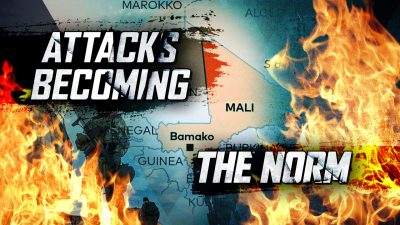Video: Jihadist Attacks in Mali Becoming the Norm, France Withdraws

All Global Research articles can be read in 51 languages by activating the “Translate Website” drop down menu on the top banner of our home page (Desktop version).
Visit and follow us on Instagram at @crg_globalresearch.
***
The situation in Mali and the Sahel is steadily getting worse, with each passing day.
On October 6th, a jihadist attack left at least 16 Malian soldiers dead, and 17 wounded. In the subsequent clash at least 30 jihadists were slain, according to a local official.
The terrorists are reportedly linked to ISIS.
Mali’s army said that troops had repelled a “complex IED attack,” referring to an improvised explosive device.
Malian soldiers, as well as French forces that support them, and United Nations peacekeepers are frequently targeted in central and northern Mali by the armed groups.
Mali has been struggling to contain fighting that first erupted in the north in 2012 and has since killed thousands of military personnel and civilians.
The entire Sahel is a chaotic area, between 5 countries, with porous borders and almost entirely infested with terrorists who torment civilians and pillage numerous villages. Central Mali has become one of the most violent hotspots of the Sahel-wide conflict, where ethnic killings and attacks on government forces are frequent.
On October 2nd, an IED attack on an UN convoy by unknown jihadists left one Egyptian “blue helmet” dead. The UN Stabilization Mission for Mali said that its resolve would only be strengthened by this “cowardly attack”.
Four Malian soldiers were killed by an IED blast in the region on September 20. Another ambush also killed five soldiers in central Mali on September 12.
Both those attacks were claimed by the al-Qaeda-aligned Group to Support Islam and Muslims (GSIM).
GSIM also said that it was responsible for an attack on a mining convoy in western Mali on September 28, which killed five gendarmes.
Instead of increasing assistance and attempting to solve the situation, French President Emmanuel Macron announced a major reduction of France’s military presence in the Sahel and the end of the existing Barkhane operation there.
Relations between Paris and Mali have been strained since two coups in the Sahel country happened in August 2020.
Most recently, on October 6th, Mali summoned the French ambassador over criticism of the government put forward by Macron.
At the UN General Assembly, Choguel Kokalla Maiga, Mali’s interim prime minister, accused France of a “sort of abandonment in full flight.”
Macron answered that Maiga’s comments were “unacceptable” and suggested that Mali’s government was “not even really one.”
Meanwhile, Mali turned to Russian mercenaries to pick up the fight and provide some semblance of security. There are numerous examples of effective work in African countries by Russian instructors and mercenaries, and the new Malian government hopes that the Sahel would be yet another successful example.
*
Note to readers: Please click the share buttons above or below. Follow us on Instagram, @crg_globalresearch. Forward this article to your email lists. Crosspost on your blog site, internet forums. etc.
SUPPORT SOUTHFRONT:
PayPal: [email protected], http://southfront.org/donate/ or via: https://www.patreon.com/southfront

